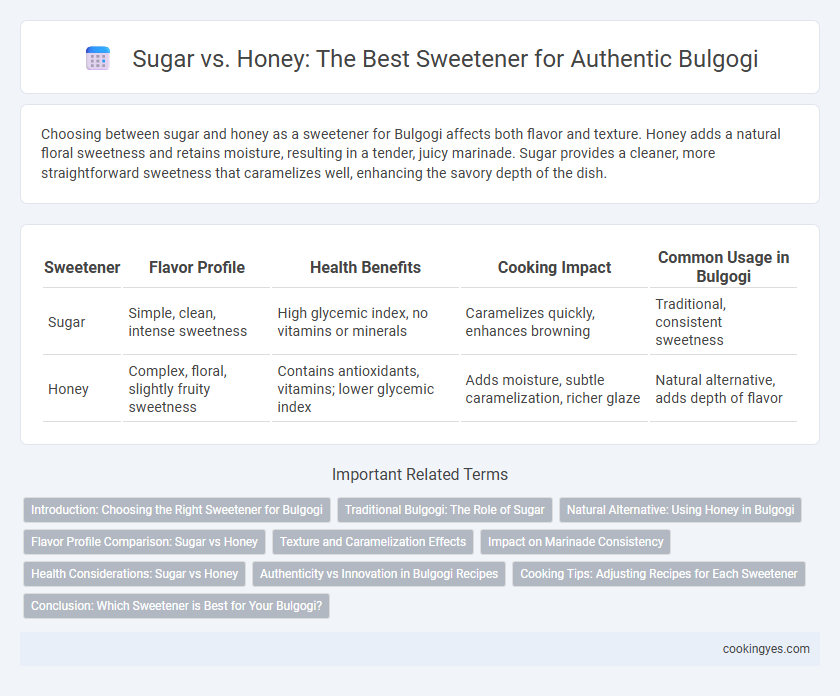Choosing between sugar and honey as a sweetener for Bulgogi affects both flavor and texture. Honey adds a natural floral sweetness and retains moisture, resulting in a tender, juicy marinade. Sugar provides a cleaner, more straightforward sweetness that caramelizes well, enhancing the savory depth of the dish.
Table of Comparison
| Sweetener | Flavor Profile | Health Benefits | Cooking Impact | Common Usage in Bulgogi |
|---|---|---|---|---|
| Sugar | Simple, clean, intense sweetness | High glycemic index, no vitamins or minerals | Caramelizes quickly, enhances browning | Traditional, consistent sweetness |
| Honey | Complex, floral, slightly fruity sweetness | Contains antioxidants, vitamins; lower glycemic index | Adds moisture, subtle caramelization, richer glaze | Natural alternative, adds depth of flavor |
Introduction: Choosing the Right Sweetener for Bulgogi
Selecting the ideal sweetener for Bulgogi significantly impacts its authentic taste and texture, with sugar and honey being the most common options. Sugar offers a clean, straightforward sweetness that enhances the savory marinade without overpowering, while honey provides a complex flavor profile and natural moisture, contributing to a richer, caramelized glaze. Understanding these differences helps tailor the marinade to personal preference and regional variations in Korean cuisine.
Traditional Bulgogi: The Role of Sugar
Traditional bulgogi recipes prominently feature sugar as the primary sweetener, balancing the savory flavors of soy sauce and garlic to achieve an authentic taste profile. Sugar's fine granules dissolve quickly, ensuring even caramelization and a glossy finish during grilling, which enhances the meat's tenderness. While modern variations may use honey for added moisture and floral notes, sugar remains the cornerstone sweetener that defines classic bulgogi's signature sweetness and texture.
Natural Alternative: Using Honey in Bulgogi
Honey serves as a natural alternative sweetener in bulgogi, offering a richer flavor profile and added moisture compared to refined sugar. Its antioxidants and antibacterial properties contribute subtle health benefits without overpowering the dish's savory elements. Incorporating honey enhances the marinade's caramelization, resulting in tender, flavorful meat with a balanced sweetness.
Flavor Profile Comparison: Sugar vs Honey
Sugar provides a clean, straightforward sweetness that enhances the savory and umami elements of Bulgogi without altering its original flavor profile. Honey offers a complex sweetness with floral and fruity undertones that add depth to the marinade, contributing subtle moisture and a slight caramelization during cooking. Choosing between sugar and honey affects the Bulgogi's overall taste balance, with sugar delivering pure sweetness and honey introducing nuanced, aromatic richness.
Texture and Caramelization Effects
Using honey as a sweetener in Bulgogi enhances the texture by creating a tender, moist result due to its higher moisture content compared to sugar. Honey's natural fructose promotes faster caramelization, giving the meat a rich, golden-brown glaze with complex flavor notes. Sugar, while effective for caramelization, may result in a slightly drier texture and less depth in the caramelized crust.
Impact on Marinade Consistency
Using honey as a sweetener in Bulgogi marinade results in a thicker, more viscous consistency due to its natural density and moisture content, which helps the marinade cling better to the meat. Sugar, especially granulated or brown, dissolves more readily and produces a thinner marinade that may not adhere as well during cooking. Honey's hygroscopic properties also contribute to enhanced moisture retention, impacting the texture and juiciness of the cooked Bulgogi.
Health Considerations: Sugar vs Honey
Honey offers antioxidants, vitamins, and minerals that provide added health benefits compared to refined sugar, which primarily contributes empty calories. The lower glycemic index of honey results in a slower blood sugar spike, making it a better option for maintaining stable energy levels during and after enjoying Bulgogi. Using honey as a sweetener in Bulgogi not only enhances flavor but also supports better metabolic health and immune function.
Authenticity vs Innovation in Bulgogi Recipes
Honey adds a natural sweetness and subtle floral notes that enhance the depth of traditional Bulgogi, aligning with authentic Korean flavors rooted in centuries-old recipes. Sugar, often used in modern Bulgogi variations, offers consistent sweetness and caramelization, making it popular for innovative twists and quick cooking methods. Balancing honey's rich complexity with sugar's straightforward sweetness can create a fusion of authenticity and contemporary culinary creativity in Bulgogi dishes.
Cooking Tips: Adjusting Recipes for Each Sweetener
Using sugar in bulgogi enhances caramelization, providing a deep, rich sweetness that balances savory flavors, but it requires careful melting to avoid burning. Honey adds a natural floral note and moisture, necessitating a slight reduction in liquids to prevent oversaturation and ensure proper glaze consistency. Adjust recipe proportions by substituting 1 cup of sugar with 3/4 cup of honey and reduce other sweet liquids by 2 tablespoons for optimal texture and flavor balance.
Conclusion: Which Sweetener is Best for Your Bulgogi?
Honey offers a richer flavor profile and natural antioxidants, making it a superior sweetener for Bulgogi compared to refined sugar. Sugar provides consistent sweetness but lacks the depth and health benefits that honey contributes. For a balanced taste with added nutritional value, honey is the best choice to enhance your Bulgogi.
Sugar vs Honey for Bulgogi Sweetener Infographic

 cookingyes.com
cookingyes.com